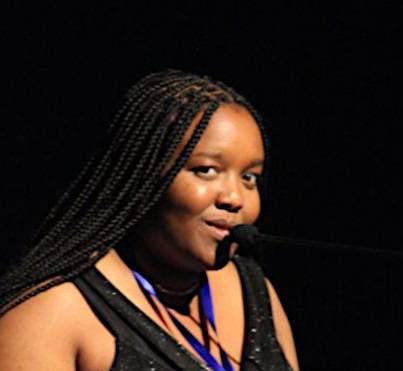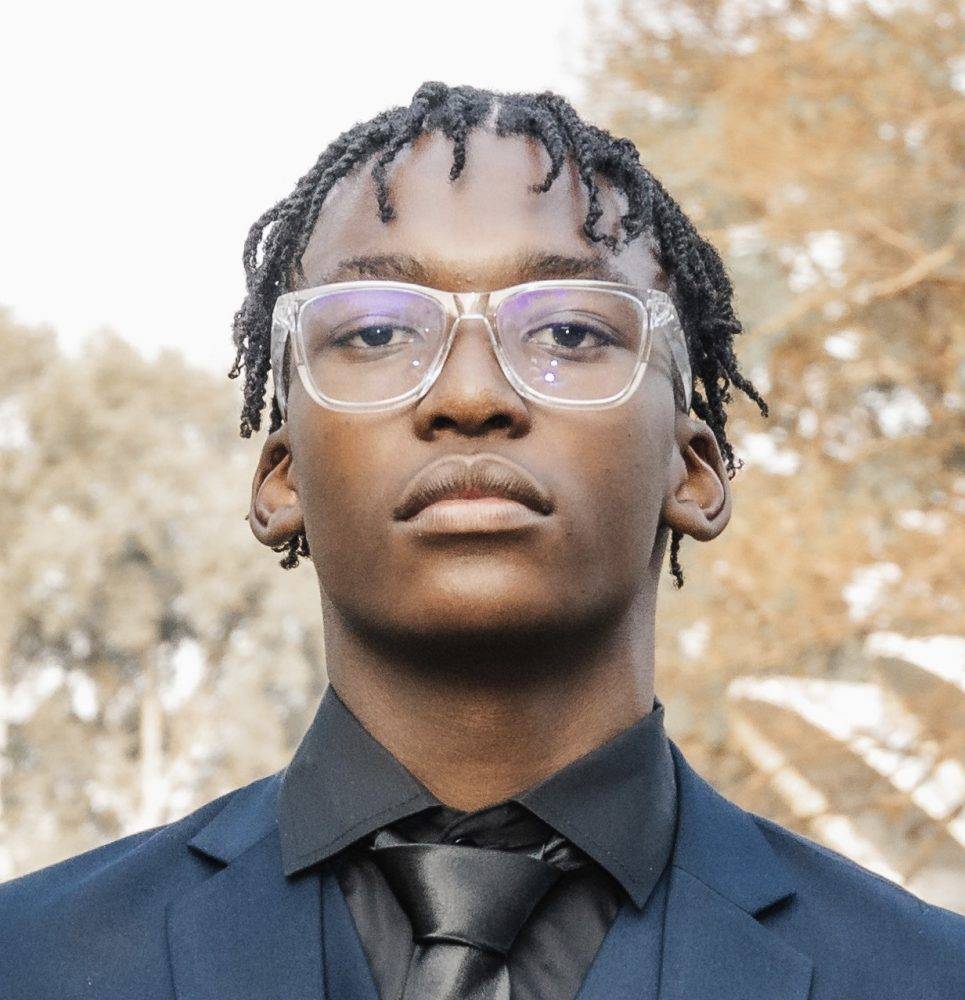Dean Zwoitwaho Nevhutalu, a Trustee at Kagiso Trust.
Young people are tokenized in politics; everyone wants them to vote, but nobody is actually addressing their concerns
The conundrum for South African youth is that many of them feel that the political parties in the upcoming national elections do not represent their interests — yet they know that by not voting, nothing is likely to change on the political front. They are asked to vote ahead of each election, but left without support or jobs after them. It is essential for the youth to understand the manifestos of the parties they wish to vote for, but how is this possible when many of them cannot read with understanding?
These and other issues emerged in a lively discussion on voter participation and the youth vote, by Kagiso Trust in partnership with the Mail & Guardian.
Moderator Lizeka Tandwa, Political Editor at the M&G, opened proceedings by asking Dean Zwoitwaho Nevhutalu, a Trustee at Kagiso Trust, who worked as the Superintendent General of the Limpopo Provincial Department of Education and was involved with CODESA, why Kagiso Trust thought it was important to have this discussion. He answered that the Trust was founded during the struggle and founding of democracy. It was a dream come true to vote in 1994, he said, and young people were everywhere, educating old people and urging them to vote.
 Obakeng Kgatshe, Youth Activism Programme Manager at the Ahmed Kathrada Foundation.
Obakeng Kgatshe, Youth Activism Programme Manager at the Ahmed Kathrada Foundation.
Since then, the youth have become less involved in politics, but if they do not actively participate in the political process, it does not augur well for the future of South Africa. “Democracy is sacrosanct and must be protected, and Kagiso Trust is dedicated to encouraging people to vote, especially the younger generation,” said Nevhutalu.
Tandwa said that less than 40% of the youth is registered to vote, and asked Obakeng Kgatshe, the Youth Activism Programme Manager at the Ahmed Kathrada Foundation, why this is so. Kgatshe answered that the Ahmed Kathrada Foundation encourages young people to vote, but has found that the reason that they are not voting is because although they are interested in the politics in South Africa, they feel the political parties do not represent them or align with their needs.
Tandwa asked whose fault is that voter participation has declined — is it the political parties? Khumo Kumalo, the founder of “94wasMisunderstood”, a newsletter engaging with South African politics and identity, said yes, it is the parties, because the youth want issues like job creation to be addressed, and the current parties are not doing so; none of them have actually engaged with young people.
What do young people want, Tandwa asked Otsile Nkadimeng, the Executive Director of a youth voting advocacy group called SoWeVote. They want jobs, growth and an environment of prosperity, and affordable healthcare, Nkadimeng replied; very few people have come out of poverty in the last 30 years. Part of the job of SoWeVote is to analyse the manifestos of political parties. “There is a feeling that South Africa is deeply flawed, that we are living on a knife’s edge,” he said.
 Otsile Nkadimeng, Executive Director of the youth voting advocacy group SoWeVote.
Otsile Nkadimeng, Executive Director of the youth voting advocacy group SoWeVote.
Nevhutalu said that back in 1994, the sentiment was one of self-reliance, of building the country up. “The first thing the youth must do is vote; they will never change anything by sitting at home.” We must all participate in who will govern us, to determine our own future.
Kumalo said there is an age limit of being 35 or older that prohibits young people from being able to engage in politics. The youth has always impacted on the political sphere in SA, from the 1976 uprisings to FeesMustFall in 2015, which happened almost a decade ago, but beyond commenting on Twitter, the voice of the youth is today restricted.
Kgatshe said everyone pretends that they want to hear youth voices at the time of elections, but what happens after 29 May? Will we see politicians going into schools and communities to address youth concerns? Nobody is listening to the issues that the youth have today, such as being able to be heard, and to be able to walk the streets in safety.
Is there a democratic backslide, Tandwa asked, to which Nkadimeng replied that the youth invested in SA’s democracy; they are involved in civil society, in civic education, in protests, in saying “these are the things that need to change”. Political leaders must involve young people in changing things. There are only two people below the age of 35 on the Presidential Climate Commission, but climate change is a very real issue for the youth. “Young people are tokenized in politics.”
Nevhutalu said young people must understand that this is their country, their responsibility. “They are looking for some kind of messiah to come and change things,” he said. Corruption is a big problem in South Africa, and sometimes even the youth are involved in it; for instance there are some SRC members who are taking bribes. Young people must be fully engaged in the democratic process before, during and after elections.
Kumalo said there is a perception that the youth are materialistic and idealistic, but they do deserve basic human rights. Most South Africans do not get the opportunity to speak out about their hardships. “If so many of our youth cannot read with understanding, how can we expect them to understand the manifestos of political parties?” he asked. When the youth do go and vote, they must understand who they are voting for.
 Kumo Kumalo, founder of the newsletter “94WasMisunderstood”.
Kumo Kumalo, founder of the newsletter “94WasMisunderstood”.
Kgatshe said the media has an important role to play, but the dominant message is for the youth to go out and vote. The media should help to break manifestos down, so they are easier to understand. It is essential that the youth understand who they are voting for; they must not feel pressured to simply go out and vote.
Nkadimeng said the discourse about politics is not aimed at young people; most of them do not have DSTV, for instance, which is where most political debates occur. It is the job of the politicians to get their message across to the people; most parties are inaccessible, and use language that does not speak to the aspirations of the youth. The youth are not a homogenous group, but most of them have no vision of a future for this country. The youth cannot access the political space, as most positions are being held or gate kept by those who took power in the 90s.
The reluctance of youth to engage in the political sphere is not unique to South Africa, it is a global phenomenon, said Nevhutalu. Even in China, where there are jobs, the youth are not engaged. The youth must start shaping who they want to vote for. Kagiso Trust has never advocated that the youth must just go and vote; young people must educate themselves on what the manifestos of various parties are about. Even if a party does not reflect all your concerns, go and vote for one that approximates what you want.
Kumalo said most of the manifestos say basically the same things. In addition, most independent parties have leaders who come from larger parties, so we are not seeing any new policies really. People in SA are living from paycheck to paycheck. The youth want to have the opportunity to improve their lot, get degrees, and get jobs. Most of us just want to see money come into the household; R350 a month is clearly not enough. Nothing is changing for the better; there are no services, and the country is dysfunctional.
Tandwa said the role of government is to create an environment conducive to doing business, but Katashe pointed out that the private sector also must play a role in development, and that communities must be better organised to hold business accountable. Nevhutalu said that the private sector must not be let off the hook, but one of the reasons it has happened is because the lines between government and the private sector are blurred. The government must be fixed.
There are few youth structures left for the youth, said Nkadimeng: “The youth have to scrape for every second of people’s attention.”
People are desperate for a new government in SA, but the opposition does not inspire confidence.
Asked about coalitions, Nkadimeng said there are hopes for national coalitions, rather than provincial or metropolitan coalitions. Kgatshe said that people are scared to vote for smaller parties because they may become kingmakers, so they vote for the devil they know. People who are involved in coalitions often just want power, and when mayors are changed too often, for instance, the effect is negative on citizens.
Closing remarks
All of the speakers were unanimous that every South African must go out and vote; for some, it will be their first election they can actually vote in. Some of the more essential points made were:
- It is a case of “gut-wrenchingly” poor choices of parties, but one has to make concessions and still exercise one’s democratic right to vote.
- It is essential to interrogate the various parties’ manifestos and track records. One must ask, how do they prioritise me?
- There will likely be a scramble for members of smaller parties making deals with the bigger parties — and it will be interesting to see who “sells their soul”.